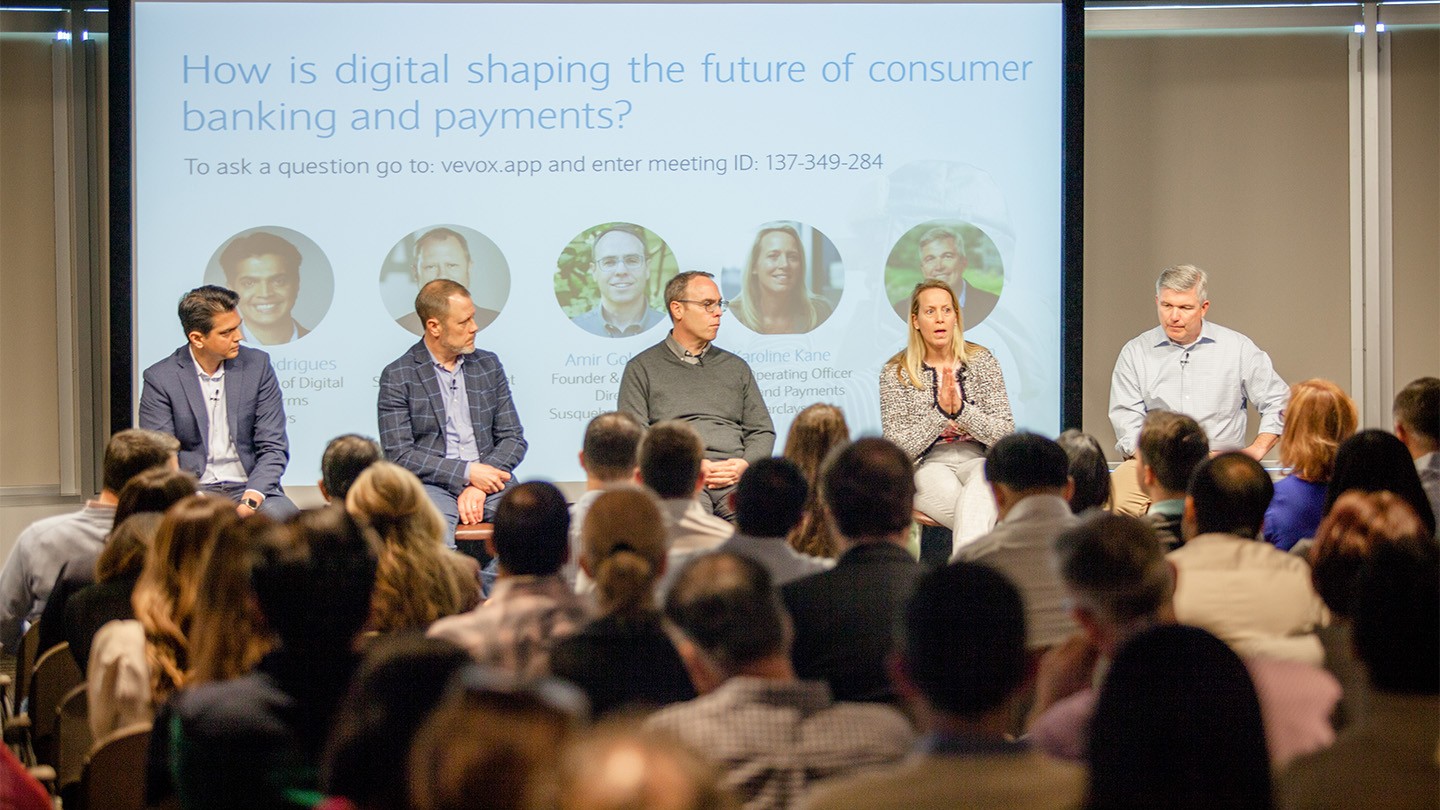
Innovation
Barclays, fintech partnerships and the future of payments
Barclays leaders consider how rapid changes in technology, consumer expectations and regulation are impacting banking and payments models, and what Barclays needs to do to adapt, thrive and best serve customers. Among the answers: partnership, agility and “intuitive” digital solutions.
“We wanted to get the curiosity going in all colleagues about what was happening in tech, and how that is shaping the future of banking and payments,” said Ruchir Rodrigues. “And also get an outside-in view.”
The Global Head of Digital and Platforms was speaking about the bank’s Digital Unleashed series, in which leaders from within Barclays were joined by experts from Big Tech to discuss the future of financial services.
One “outside-in” view was provided by Brian Cole, Head of North American Products at Visa. Addressing the question of whether the boom of investment in new fintechs is sustainable, he said: “The fintech rush will continue for as long as there are problems that need to be solved. There are already problems that we know need to be solved, never mind the problems we haven’t seen yet.”
For Barclays, this is tied to consumer expectations and the need to develop solutions that can scale quickly. With Rodrigues pointing out that “the pace of change accelerates every day”, Denny Nealon, President at Barclays US Consumer Bank, said that the bank’s intention was to “out-fintech the fintechs”.
It’s a question of how we balance the need to own, and at the same time take the advantage of other companies delivering best-in-class capabilities. We have to keep knocking down barriers to building at pace.
President at Barclays US Consumer Bank

Barclays is leading the way in the new world of payments through partnerships, agility and “intuitive” digital solutions.
“There’s no reason we can’t deliver equivalent merchant and customer experiences, but they don’t have the balance sheet that we have,” he said. “That’s a fundamental benefit we have, and that’s an opportunity we have to deliver things in a digital-first, intuitive way.”
“Can we move at pace?” he continued. “Can we keep up with the fast pace of the payments industry? We invest a lot in our technology platforms and in reinventing how we do business and being more agile. But it can’t stop there. If we think we have to build everything, we’re in trouble.
“We can’t own every element of the chain – it would slow us down, we wouldn’t have best-in-class products for our customers. It’s a question of how we balance the need to own, and at the same time take the advantage of other companies delivering best-in-class capabilities. We have to keep knocking down barriers to building at pace.”
Asked by Rodrigues “what’s happening in the investment side for fintechs?”, Amir Goldman, Founder and Managing Director of Susquehanna Growth Equity, said: “For those of us who were around and active during the dot com bubble of 1999, there was a lot of garbage there, but if we had bought 10 internet stocks, we would have been really happy now and really rich. I think that the fintech revolution in a lot of ways hit that same modality.
“The way we look at it as investors is, there are certain companies that I believe are in a bubble and they happen to be companies that compete with big banks. Those companies to me were created out of the post 2007 crisis vacuum but they’re inherently and structurally disadvantaged versus the bank. On the other hand, any company that’s able to take advantage of beautiful user interfaces and agile technology developments and customer experience – those are the ones that are going to create a lot of value.”
High stakes and staying nimble
The emphasis on partnership – whether with fintechs, with customers like Uber, or with service providers like AWS and Salesforce – was seen as key to keeping ahead of the payments landscape.
Karoline Kane, Chief Operating Officer, Cards and Payments, said that in the last two years, Barclays has transformed the way it delivers technology: “It’s all about speed of execution and not feeling like we have to own it all from end to end. Because there are best-in-class partners that we can work with. We’ve proved with our integration with Uber that we can do it very nimbly – we did it in 150 days, and continuing that mindset to test and learn, fail fast, move on and succeed is what we have to do.”
Nealon warned of the high stakes involved in getting services right, saying “the expectations of our partners and customers are becoming more and more digital, and are changing every day. We have to keep pace with that kind of movement in the customer experience. The opportunity is to make best-in-class experiences driving more customers to payment products. We have to deliver that in a way that is intuitive to people.
“People have learned to expect to do all sorts of things on their phone, and when a company can’t deliver that we’re not going to hear a complaint – they’re just going to stop using.”
He concluded by reiterating the need for partnerships with the new kids on the block: “It’s human nature to want to be the builder, but the more you can take from partners, the more likely you are to be able to offer the full palette.”